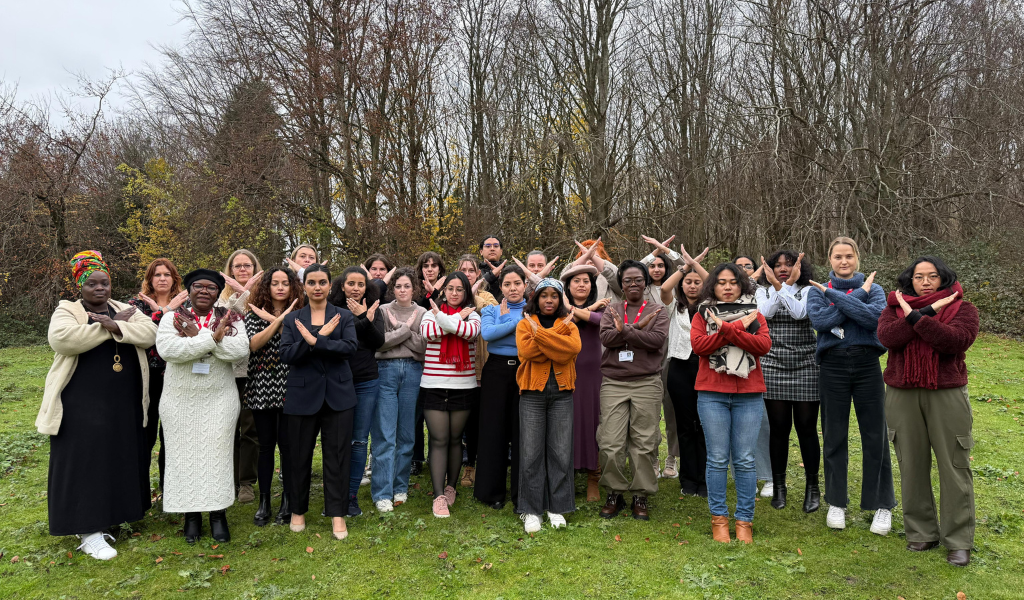The 16 Days of Activism against Gender-Based Violence serves as a global campaign to amplify voices, movements, strengths and struggles in the fight against gender-based violence (GBV). This year, MA students from the Gender and Development programme at the Institute of Development Studies (IDS)—one of the longest-running degrees on gender and development —contributed through a series of reflections, poetry, and artistic expressions shared on IDS’s social media platforms. Their contributions highlighted diverse GBV experiences while honouring the legacy of past feminist activists.

Reflections
Sawsun Wafia from Bangladesh criticised the misallocation of funding meant for women’s issues, arguing that it rarely reaches grassroots movements at the forefront of combating GBV. Instead, resources are often directed toward programs that fail to address the deeply ingrained social norms perpetuating violence. Wafia called for greater investment in initiatives that engage with systemic and long-term challenges rather than surface-level solutions.
Akinyi from Kenya posed critical questions about accountability in addressing GBV. She emphasised the need for practical interventions, asking, ‘Do our GBV helplines work in remote areas of Kenya? How accessible are evidence collection and reporting processes for survivors?’ These important and urgent questions highlight the systemic barriers to justice in rural and underserved communities.
Naomi from Tanzania shared visuals from a GBV-focused event hosted by her organisation, Omom Maasai Community Foundation. The gathering provided a space for women to share messages of solidarity and strength, reinforcing the importance of collective resilience in combating violence.
Fana’s poem, Generations of Strength, highlighted the intergenerational persistence of violence, while also affirming women’s resilience. She paid homage to her grandmother and mother, asserting that while the forms of violence may evolve, women’s strength endures. Her poetry offered a powerful reminder of care and solidarity among women.
Sarah from the United States shared a powerful excerpt from the book Know My Name by Chanel Miller, reflecting on the ways violence disrupts women’s lives. She emphasised that behind every statistic is a survivor navigating the challenge of reclaiming agency: ‘Behind every statistic is a woman looking for ways to be in the world again.’
Aya from Sudan shared the poem River Styx by Sudanese women, dedicating words of hope to women in Sudan enduring the dual struggles of war and GBV. She commended their resilience, offering comfort and optimism for a future without conflict.
Examples of historical and contemporary struggles
Mary from Myanmar spoke about the lasting effects of violence in the region
post-independence. She drew attention to the psychological, social, and economic scars borne by survivors, many of whom lack access to critical support systems.
Olivia from South Africa reflected on Sethembile Msezane’s protest art during the dismantling of the Rhodes statue at the University of Cape Town. She framed this act as a feminist resistance and emphasised the importance of drawing strength from historical and contemporary struggles for justice.
Zohra from Afghanistan highlighted the compounded vulnerabilities faced by women in conflict-affected areas. She emphasised their economic hardships and social isolation, which exacerbate their exposure to violence.
Alice from the United Kingdom, drawing on her 15 years of experience as an Independent Gender Violence Advocate, shared a moving anecdote from a client’s card. The client wrote, ‘I felt filthy, ashamed, and stupid. And you showed up and spoke to me with utter respect and dignity..’ Alice concluded with a powerful assertion: ‘We must teach abusers that they are unsafe and provide comfort to those harmed.’
Sofie from Denmark shared a poem and drawing, both titled I Would Rather Meet a Bear. Her work captured the fear and avoidance many women feel toward men, vividly illustrating the pervasive threat of GBV.
Maria from Peru addressed violence in Latin America, emphasising the need to make GBV visible rather than dismissing or normalising it. She called for collective solidarity and action to combat the widespread crisis.
Seboueng Tau from Lesotho pointed out a hard truth during the country’s 200th bicentennial celebrations. While it’s a moment to celebrate resilience and unity,
gender-based violence is still a major issue, and the numbers are only going up—a clear sign that no nation is truly free if its people are living in fear.
Final thoughts
The reflections from these students show major commonalities despite the diversity of their experiences. GBV transcends borders, manifesting in both public and private spheres. The contributors collectively emphasise that advocacy must move beyond awareness to actionable change.
They call for dismantling systemic barriers that perpetuate violence, prioritising grassroots initiatives, and envisioning futures where survivors are not treated with pity but with urgency and respect. As one student concluded, ‘Victims are not numbers; they are people with hearts and minds of their own, deserving a life of dignity.’
This collective effort is a small contribution to emphasising the importance of solidarity, innovation, and systemic engagement in the global fight against GBV.


